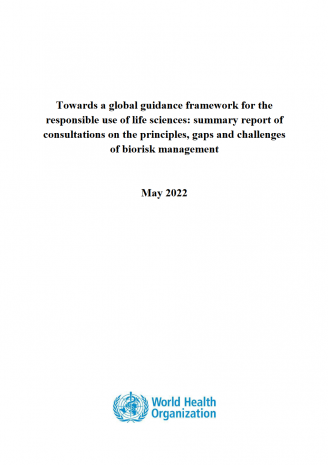Towards a global guidance framework for the responsible use of life sciences: summary report of consultations on the principles, gaps and challenges of biorisk management
Research and application of the life sciences offer both opportunities and risks to health, safety and security. To ensure that current and future advances in the life sciences are used for the betterment of humans and the planet’s biodiversity, ecosystems and environment, it is important that the scientific community adhere to high scientific, safety, security and ethical standards.
To further this aim and to motivate and strengthen safe, secure, responsible practices, the World Health Organization (WHO) is developing a Global Guidance Framework for the Responsible Use of Life Sciences. As part of this process, WHO formed four working groups of experts. This report provides a short summary of the work of the expert working groups and their principal recommendations.
- Recommendation 1: The World Health Organization should endorse and actively promote the values and principles presented in this document.
- Recommendation 2: The World Health Organization (where appropriate, in collaboration with other United Nations agencies, and diverse stakeholders) should raise awareness about the importance of biorisk management.
- Recommendation 3: The World Health Organization (where appropriate, in collaboration with other United Nations agencies, and diverse stakeholders) should support progress in development of governance tools and mechanisms for basic and applied life sciences.
- Recommendation 4: Member States should establish tools and mechanisms for governance of basic and applied life sciences by introducing and enforcing comprehensive biorisk management policies, including laws, regulations, standards, guidelines, best practices, codes of ethics, research review processes, education and training.
- Recommendation 5: Academic institutions should educate students and trainees in science, technology, engineering and mathematics about biorisk management.
- Recommendation 6: Research institutions, funders and other stakeholders should promote a culture of biosafety and biosecurity in research environments at every stage of basic and applied life sciences.
- Recommendation 7: Publishers should promote and practise a culture of biorisk management in scientific publishing.
- Recommendation 8: Scientists should educate themselves about biorisk management and their responsibilities and foster broader awareness-raising of the importance of biorisk manage

